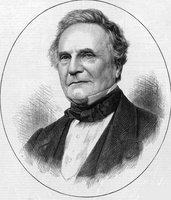










Charles Babbage was an English polymath.A mathematician, philosopher, inventor and mechanical engineer, Babbage is best remembered for originating the concept of a programmable computer.
Babbage was a British mathematician, an original and innovative thinker and a pioneer of computing.
Charles Babbage was born on 26 December 1791, probably in London, the son of a banker. He was often unwell as a child and was educated mainly at home. By the time he went to Cambridge University in 1810 he was very interested in mathematics.
After graduation Babbage was hired by the Royal Institution to lecture on calculus. Within two years he had been elected a member of the Royal Society and, with his Cambridge friends, was instrumental in setting up the Astronomical Society in 1820, the first to challenge the dominance of the Royal Society. From 1828 to 1839, Babbage was Lucasian Professor of Mathematics at Cambridge.
The idea of mechanically calculating mathematical tables first came to Babbage in 1812 or 1813. Later he made a small calculator that could perform certain mathematical computations to eight decimals. Then in 1823 he obtained government support for the design of a projected machine with a 20-decimal capacity. Its construction required the development of mechanical engineering techniques, to which Babbage of necessity devoted himself. In the meantime (1828–39) he served as Lucasian Professor of Mathematics at the University of Cambridge.
During the mid-1830s Babbage developed plans for the Analytical Engine, the forerunner of the modern digital computer. In this device he envisioned the capability of performing any arithmetical operation on the basis of instructions from punched cards, a memory unit in which to store numbers, sequential control, and most of the other basic elements of the present-day computer. The Analytical Engine, however, was never completed. Babbage’s design was forgotten until his unpublished notebooks were discovered in 1937. In 1991 British scientists built Difference Engine No. 2—accurate to 31 digits—to Babbage’s specifications.
Babbage made notable contributions in other areas as well. He assisted in establishing the modern postal system in England and compiled the first reliable actuarial tables. He also invented a type of speedometer and the locomotive cowcatcher.
Gold Medal of the Royal Astronomical Society